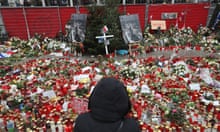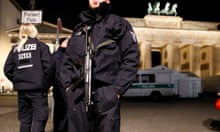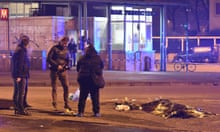Anis Amri, the main suspect in the Berlin Christmas market attack, had been under the watch of Germany’s Centre for Terror Defence (GTAZ) since January as someone deemed a threat to public safety because of his links to the Islamic radical scene and his apparent readiness to carry out an attack, security sources have told the German media.
Sources involved in the investigation into Monday’s crash say Amri’s telecommunications had been monitored by German security agencies. It is understood that he was arrested once this summer in Berlin but there was not enough evidence to hold him.
The interior ministry select committee said Amri’s name had last been raised within the GTAZ – a cooperation and communication platform for police and security agencies – as recently as last month, according to the Süddeutsche Zeitung.
Inevitably, questions are being asked as to how Amri – who arrived in Germany in July 2015 and applied for asylum in April – was able to hide in plain sight of the authorities for so long. His asylum application was turned down by German authorities in consultation with security agencies.
Amri regularly changed his place of abode, shuttling between the state of North Rhine-Westphalia and Berlin, where he had mainly been living since February. North Rhine-Westphalia’s interior minister, Ralf Jäger, said he was “highly mobile”.
The Federal Criminal Police Office (BKA) has put up a €100,000 bounty for Amri’s capture and said he could be armed and dangerous. It described him as 178cm tall, around 75kg, with black hair and brown eyes.
Born in Tunisia in 1992, Amri has used six different aliases and posed as a citizen of two other countries – Egypt and Lebanon.
He came to the attention of German authorities because of his links with the radical Salafist Abu Walaa, alias Ahmad Abdulaziz Abdullah A, a 32-year-old Iraqi Isis supporter known as the “preacher without a face”, who was arrested in the northern town of Hildesheim in November.
Amri also had contact with a known Turkish Islamic fundamentalist, Hasan C, 50, who worked in a travel agency in Duisburg-Reinhausen where he is believed to have radicalised young Muslims, and with Boban S, a hate preacher from Dortmund.
In July, Amri was involved in a knife attack in a row over drugs. He went underground when police tried to question him.
According to an anti-terror investigator speaking on condition of anonymity to German media, Amri had sought accomplices for a terror attack in early 2016, and had shown an interest in weapons. Despite authorities being made aware that he wanted to buy a pistol, there were apparently no attempts to take him into custody.
Another investigator told German media it was believed he might have been planning an attack in Germany, “but apparently there was not enough evidence to arrest him”.
In Tunisia he is reported to have been arrested several times for drug abuse.
His family said they were shocked by the news that Amri was the main suspect in the Berlin attack. “When I saw the picture of my brother in the media, I couldn’t believe my eyes. I’m in shock, and can’t believe it’s him who committed this crime,” his brother Abdelkader Amri told AFP. “But if he’s guilty, he deserves every condemnation. We reject terrorism and terrorists – we have no dealings with terrorists,” he said.
His sister Najoua Amri said: “He never made us feel there was anything wrong. We were in touch through Facebook and he was always smiling and cheerful. I was the first to see his picture and it came as a total shock. I can’t believe my brother could do such a thing.”
Amri’s parents, who live in Oueslatia, central Tunisia, were being questioned by Tunisian security officials on Wednesday. He has four sisters and a brother; it was unclear if they too were being questioned.
A security source said Amri had fled Tunisia after the 2011 revolution in which the longtime dictator Zine El Abidine Bel Ali was overthrown, and spent three years in Italy before moving on to Germany.
His application for asylum in Germany was rejected in June this year but authorities were unable to deport him because he did not possess the right documentation. The correct papers are said by German authorities to have arrived from Tunis on Wednesday. Amri was due to have been deported before the end of the year.
That the Berlin truck attacker appears to be of Tunisian origin is an unwelcome reminder for Tunisian authorities of the number of homegrown terrorists who have wrought havoc overseas.
Despite Tunisia being a success story in terms of retaining the democracy it gained in the Arab Spring, it has become a recruiting ground for jihadis.
The German interior ministry estimates that more than 3,000 would-be terrorists have left Tunisian shores to join radical groups such as Islamic State and Jabhat al-Nusra in Iraq, Syria and Libya.
Intelligence experts will be studying whether the Berlin suspect was inspired by his fellow Tunisian Mohammed Lahouarej-Bouhlel, a guest worker in France who last July drove a truck into Bastille Day crowds in Nice, killing 86 people. Lahouarej-Bouhlel, from Sousse, had migrated to France several years ago. His family said he had psychological problems that may have led him to join Isis.
Amri’s identity card was found in the truck in Berlin, giving his home town as Tataouine, in Tunisia’s southern desert, and his registered address in Germany as an asylum shelter in Emmerich am Rhein, in North Rhine-Westphalia.
Tataouine has been a fruitful area for Islamic State. While the country’s democracy is well-entrenched, gains of the revolution are yet to feed through to the impoverished interior, leaving a large pool of angry young men for Isis to attract.
In Tunisia itself Isis has launched a series of high-profile attacks, killing 23 visitors at the Bardo museum in Tunis in March last year, and 38 tourists, 30 of them British, at Sousse three months later.
In the most audacious attack by Isis, in March this year, militants briefly captured the border town of Ben Gardan, 5o miles from Tataouine. Within hours security forces had recaptured the town after bloody fighting that left 13 soldiers and 45 militants dead.
Tunisia’s interior minister, Hedi Majdoub, met British intelligence and security officials in London this month, emphasising his concern that countering terrorism required not just better intelligence but economic reform to lift young people out of poverty.
Tunisian forces are engaged in a cat-and-mouse game with militants in the interior. In October Britain sent 40 soldiers to train Tunisian counter-terrorism units in the south of the country. The defence secretary, Michael Fallon, at the time emphasised Britain’s “determination to support our Tunisian allies”.







